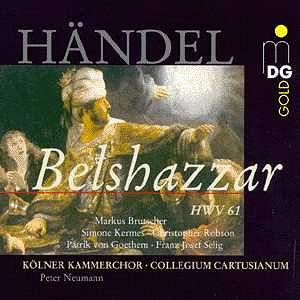Belshazzar is one of Handelís works that could be called
a total failure at the time of its first performance. Premiered in 1745
to a nearly empty house, contemporary reports say that it was a disastrously
bad performance. This oratorio never gained popularity in Handelís lifetime,
and he only performed it twice after the first performance. Yet this
is no minor work. Full of great Handelian arias, and stirring choral
movements, this oratorio deserves to stand among his greatest works.
Drama and energy play like a flame through the pages of this work. It
has everything a Handel oratorio needs: tension, excitement, and attractive
melodies.
Peter Neumann has recorded four oratorios for MDG,
all with the same good sound, and with well chosen soloists. Soprano
Simone Kernes is wonderful, and shines in several arias. Bass Franz-Josef
Selig is of also strong, and his first solo aria, Oppressíd with never-ceasing
grief, has that familiar sound that recalls so many other arias in Handelís
oratorios. Alto Christopher Robson is a bit of a disappointment, however;
his voice is weak and wispy, and not very attractive.
I am partial to the long, strophic arias that Handel
includes in each of his oratorios. There is something about the way
the music settles in over such a long time and develops in energy. Here,
two such arias stand out, each over eight minutes long: O, sacred oracles
of truth!, very well sung by alto Patrick van Goethem, and The leafy
honours of the field, sung by Simone Kernes, who, unfortunately does
not have enough chances to show her talent in this work. She has a magnificently
pure voice, perfectly suited to the Handelian repertoire. It is a joy
to listen to her in this music.
There are several magnificent, joyous choral movements,
beginning with Behold, by Persiaís hero made. Pete Neumannís choirs
are consistently good in all of his Handel recordings, and this work
is no exception. This is all the more extraordinary when one considers
the difficulty in obtaining such fine choral recordings, so well-balanced
with the orchestra, in live performances.
Peter Neumann again shows that he is one of todayís
finest interpreters of Handelís oratorios. With a bold approach, recording
live performances to capture the energy of the stage, and MDGís trademark
high-quality sound, this is a strong contender.
Kirk McElhearn
